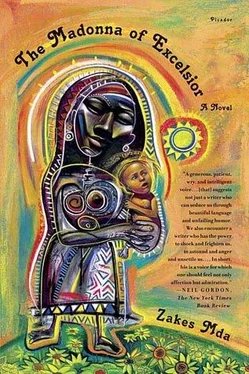“Is there a budget for a feast?” asked Lizette de Vries.
“The first thing they think about is a feast,” said Tjaart Cronje. “Not the roads, not the water, not the sewerage and rubbish removal. But a feast! That’s the problem with these affirmative actiorl people.”
“You can’t call a fellow member an affirmative action person, Mr Cronje,” said Viliki. “You will have to withdraw that remark.”
“Withdraw?” asked Tjaart Cronje, with a scoffing chuckle. “Have I spoken a lie? Are you not here because of affirmative action? Aren’t you people everywhere because of affirmative action? Didn’t I leave the army because it was absorbing terrorists into its ranks? The very people I had been taught were the enemy of the Afrikaner race?”
“That has nothing to do with this council,” said one of the National Party members.
“It has everything to do with this council!” shouted Tjaart Cronje, foaming at the mouth. “I worked hard in that army. I deserved a promotion. But did I get it? No! Instead a black terrorist was promoted. I couldn’t stay in an affirmative action army and salute an affirmative action general. I resigned and came back to Excelsior to run my mother’s butchery.”
During these rantings, Popi had sneaked back into her seat where she sat quietly.
“Mr Cronje will have to apologise for insulting fellow members of the council,” insisted the mayor.
“Well, Tjaart, you know you can’t run away from these affirmative action people, as you call them,” said Lizette de Vries, obviously amused. “They are everywhere in South Africa. Where are you going to go now?”
“That is why my party wants a separate homeland for the Afrikaners,” screamed Tjaart Cronje.
The whole council laughed. Some members of the Movement heckled that he would not have a homeland in Excelsior.
“Questions of the homeland are discussed in Parliament,” said Lizette de Vries. “Here we are only concerned with how best we can run this town.”
“Don’t even speak, Tant Lizette,” cried Tjaart Cronje in great anguish. “It is people like you who have sold this country down the drain. You and your Broederbond. The founders of the Broeder-bond must be turning in their graves. When they established the organisation in 1918, its aim was to fight against the hypocrisy of the English who were discriminating against the Afrikaner in the civil service and in business. But soon the Broederbond began to discriminate against those Afrikaners who were not members. And now the Broederbond has handed this country over to the communists on a silver platter.”
The members of the council applauded mockingly.
“We are not interested in your internal Afrikaner politics and your broedertwis,” said a member of the Movement, laughing.
“You grew up with this man, Viliki. er. Your Worship,” said another member. “You should know how to calm him down.”
“He was not like this when we were growing up,” said Viliki, not bothering to hide his exasperation. A chairperson who lost control of the proceedings would clearly lose the respect of the members.
WE HAD HEARD the news even before he arrived in Mahlatswetsa Location. We welcomed him into the township with ululations. We lifted him shoulder-high and toyi-toyied with him. Chanting slogans of his prowess. On the spot we composed a song: Ruler of all. Ruler of even the mightiest and the richest of Excelsior. He who holds sway over Adam de Vries, Captain Klein-Jan Lombard, Tjaart Cronje, Johannes Smit, Gys Uys, François Bornman and the rest of the genteel people of Excelsior . We sang until we arrived in front of his mother’s shack. We called out to Niki to come and savour the victory of her loins.
But Niki did not venture out. She lay on the bed and mumbled that they wanted to take all her children away. That not only did they want to take these children away, they were actually doing it. Taking them away one by one. And there was nothing she could do about it.
The days that followed saw Niki’s shack gaining fame countrywide. It was because of the photograph of Viliki Pule, Mayor of Excelsior, barefoot, sitting on a chair outside the shack, wearing the mayoral chain. It graced the front pages of major national newspapers.
24. EVERYBODY IS A HERO AT ONE TIME AND A VILLAIN AT ANOTHER TIME
SHE is a dreamer. A raw sienna mother with splashes of crimson. And she spends her red days lying naked on the red soil between two peach trees with blue trunks. She gave birth to the trees so that they could provide her with shade. But there is hardly any shade because the trees do not bear leaves. Only pink blossoms. Born and reborn all year round. Without bearing fruit.
We were able to read Viliki’s and Popi’s lives in the void of their rebirth. Born again, not into some charismatic religious faith, although Popi continued to sing for the Methodists and for the dead at funerals. Born again into the suaveness of local government politics.
We called them the Pule Siblings. The people of the Movement called them the Pule Comrades. And we talked of them as though we were talking of one person. Viliki-and-Popi. A united front against retrogressive forces in the council chamber. For two years, the voice that came from their mouths was one voice. Same tone. Same timbre.
At the time, we did not know that the united front was just that — a front. That when they got home, they fought raging bat-des in which the brother tried to contain the tempestuousness of the sister. To the extent that a chasm was developing between them.
When Viliki visited Niki’s shack, Niki would notice the tension between her children. She would mumble that they had finally succeeded in taking her children away. When Popi visited Viliki’s house, they did nothing but argue. Her visits were becoming less frequent.
Viliki’s house itself had been a source of argument. It was an RDP house, of the Reconstruction and Development Programme. Four tiny rooms. Two bedrooms, one lounge and one kitchen. A small concrete stoep at the front door. Grey walls of slightly roughcast cement blocks. Corrugated-iron roof. Big burglar-proofed windows on both sides of the varnished pine door. A small garden in front and a small garden at the back. Four strands of loose barbed wire on three sides of the yard, separating the RDP house from other RDP houses. No fence in the front.
Viliki’s house had a well-tended lawn in front, and a number of the arums that are known as varkoore because of their flowers that are shaped like the ear of a pig. The arums were in bloom with white and black flowers for most of the year. Passers-by stopped to take a closer look, for they had never seen black flowers before.
The back garden had a water tap and a small patch of cabbages, tomatoes and spinach. A pit latrine in one corner.
RDP houses were the pride of Viliki’s town council. A number of them had been built since it assumed power two years ago. More people had been housed than at any time in the history of Excelsior. In two years, Mahlatswetsa had become a sprawling township of grey houses and some red brick houses.
Very few shacks could be seen in the location. And those that did remain were in yards that had clear signs that construction of a more meaningful magnitude was about to begin. Or had begun. It was the objective of the council to eliminate shacks altogether. Every citizen of Excelsior deserved to live in a proper house.
Viliki had allocated himself a house quite early on. And so did the four other members of the council who came from Mahlatswetsa. Popi had refused a house, and had continued to stay in her shack with her mother. She used part of the stipend of seven hundred rands that she received from the town council to dig a foundation and buy concrete blocks. She was going to build herself and her mother a bigger and better house. A house with five big rooms and a bathroom and a toilet. No one would ever go outside again for ablutions or when responding to the call of nature. There would be no need for a chamber-pot anymore. But after two years, the house was only knee-high. Seven hundred rands a month could only go so far, especially as she also had to buy monthly groceries with it.
Читать дальше












